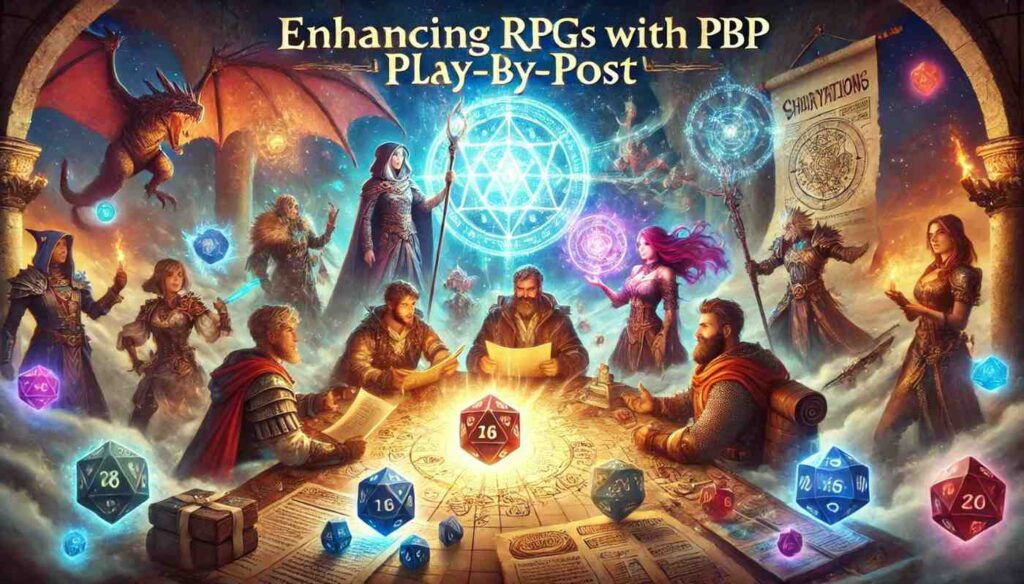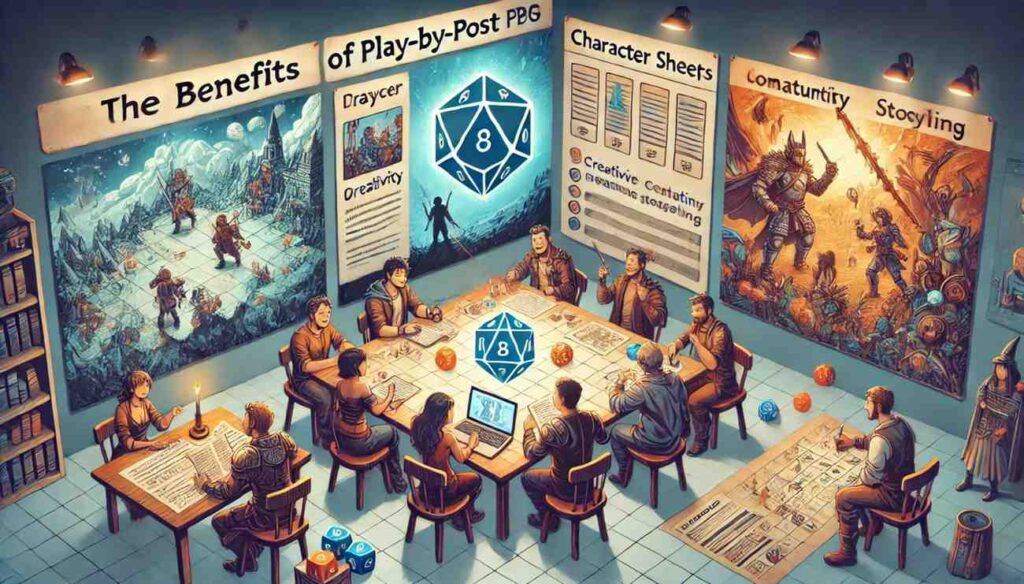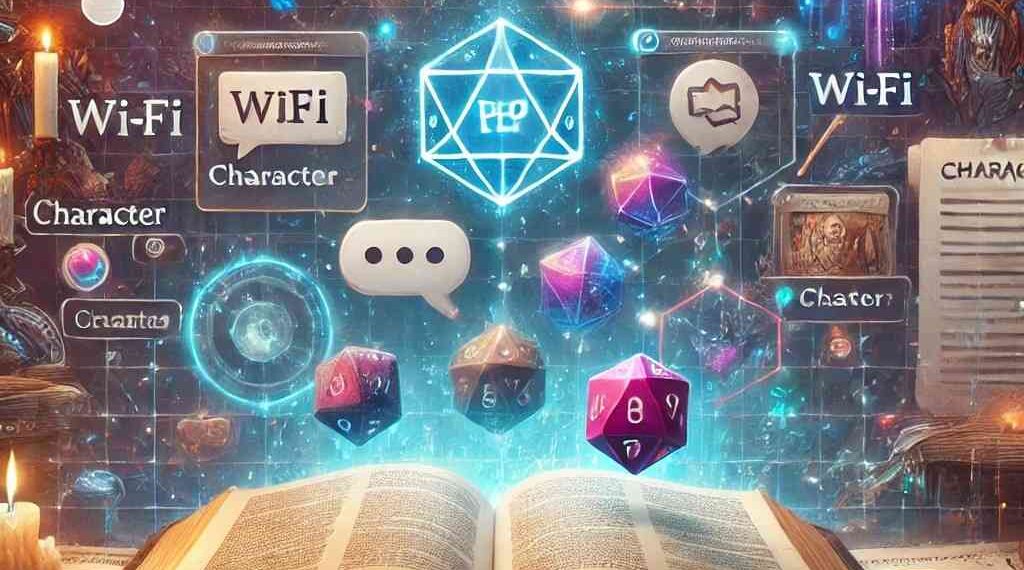Gameynix.com might contain affiliate links from amazon.com, so that we might earn referral commissions for each qualified purchases. It helps us to keep this website active and motivates us to make more valuable contents for visitors.
Introduction: What Does PBP Mean in Role-Playing Games?
Have you ever thought about playing a role-playing game (RPG) where you don’t need to be online at the same time as everyone else? Whether you’re new to RPGs or just looking for a more relaxed way to play, PBP (Play-by-Post) games might be the perfect fit for you. So, what does PBP mean in role-playing games, and why should you care? In this blog, we’ll break it down in a way that’s easy to understand for beginners, explain why it’s such an interesting way to play, and walk you through how it can enhance your RPG experience.
Relevance to New Players and RPG Enthusiasts:
In today’s fast-paced, online gaming world, finding time to sit down with friends for a real-time RPG session can be tricky. This is where PBP games come in. Whether you’re just starting with RPGs or are an experienced gamer seeking a slower, more story-focused experience, understanding what does PBP mean in role-playing games can open up a new way of playing. So, if you’re someone who loves creativity, storytelling, and connecting with fellow gamers in an asynchronous way, read on—PBP could be just the RPG style you’re looking for.
What Does PBP Mean in Role-Playing Games?
PBP stands for Play-by-Post. It’s a type of role-playing game where players don’t interact in real-time but instead communicate through written posts. These posts are shared on forums, message boards, or online platforms dedicated to RPGs. The beauty of this format is that players have time to think about and craft their responses. They aren’t rushing to make decisions as they would in a live, voice-based game.
When you play PBP RPGs, you write your character’s actions, dialogue, and thoughts into a post, which is then read by other players and the Game Master (GM). The game progresses as players continue to post back and forth. This creates a slow, immersive experience where everyone can take their time and add depth to their characters and the world they’re in.
Example of a PBP Post : What Does PBP Mean in Role-Playing Games?
Imagine you are playing a rogue character named Lira in a fantasy world. Your character has entered a dark forest, searching for a rare flower that only blooms under a full moon. You’ve just encountered a group of bandits. Here’s how a PBP post might look:
Lira’s Post:
“Lira crept forward, the cool night air brushing against her face as she carefully navigated the forest floor. Her heart raced—not from fear, but from the thrill of being so close to the rare Moonflower. She adjusted her hood to stay hidden in the shadows as she surveyed the area. The rustling of leaves signaled the approach of someone—or something. Lira quickly ducked behind a tree, her hand on the hilt of her dagger, ready for anything. ‘I can’t let them see me,’ she thought, as she glanced over her shoulder.”

Response to Lira’s Post (by the GM):
“You hear the clink of metal and soft muttering voices. From behind the tree, you can just make out two bandits, each armed with a crude sword and a wicked grin. They don’t see you yet, but they’re drawing closer. The Moonflower is just a few yards ahead. What do you do?”
And more players can join and continue writing the posts as a storyline.
Why Understanding PBP Is Important
Understanding what does PBP mean in role-playing games is key for anyone new to the genre. It allows you to get into the world of RPGs without the pressure of needing a constant, immediate response. For beginners, this means less stress and more fun as you get to experience the game at your own pace.
Why is PBP Important in Role-Playing Games?
The Power of Flexibility
One of the biggest reasons PBP is important in RPGs is because it allows for flexibility. In traditional RPGs, players often need to schedule real-time sessions, which can be challenging due to different time zones or busy schedules. With PBP, you don’t have to worry about coordinating schedules with others. You can log in whenever it’s convenient for you and continue where you left off.
No Time Pressure
Another reason PBP is valuable is that it removes the pressure of making decisions on the spot. In many RPGs, particularly those played in real-time, you may feel rushed to make your character’s next move. With PBP, you have time to think about your character’s motivations, actions, and dialogue. This is perfect for beginners who might not yet feel comfortable in a fast-paced setting.
Perfect for Beginners and Casual Gamers : What Does PBP Mean in Role-Playing Games?
For beginners, PBP is a fantastic way to ease into role-playing games. It allows new players to focus on the role-playing aspect—developing their characters and crafting stories—without worrying about memorizing rules or keeping up with fast-paced action. It’s a more relaxed way to experience the genre.
Example:
Imagine you’re playing a wizard character in a medieval fantasy RPG. Instead of instantly deciding to cast a spell in real-time, you can take time to describe the environment, how your character feels, and what their next magical move will be. This type of game is perfect for those who enjoy thinking things through.
How Does PBP Enhance Role-Playing Games?

Asynchronous Play : What Does PBP Mean in Role-Playing Games?
PBP enhances RPGs by offering an asynchronous playstyle. This means that players can interact with the game without needing to be online at the same time. For players in different time zones or those with busy schedules, this is a game-changer. You’re not tied to a specific time slot—just log in, read the posts, and make your next move at your convenience.
Deep Storytelling and Character Development
Unlike traditional RPGs, which often focus on combat or speed, PBP lets you build your character’s story over time. Since you have time to think and craft detailed posts, you can delve into your character’s backstory, motivations, and emotions. You’re not just responding to the current situation; you’re developing a character who feels real and has personal growth throughout the game.
Example of Enhanced Storytelling
Let’s say your character is a brave rogue who is torn between helping a town and pursuing a personal vendetta. In a real-time RPG, this might come across quickly in a few words. But in PBP, you can take your time, exploring your character’s internal conflict.
“Brenna stands in the shadows, watching the people she’s sworn to protect. A part of her wants to stay and help them, but the haunting memory of her brother’s betrayal urges her forward, toward the hidden enemy.”
This depth of storytelling would be harder to achieve in a fast-paced, real-time RPG.
Benefits of PBP in Role-Playing Games

When we ask, “what does PBP mean in role-playing games?”, we’re talking about a format with many benefits that cater to players who love storytelling, flexibility, and a relaxed gaming environment. Let’s explore why Play-by-Post (PBP) games have such a unique appeal.
1. Flexibility in Timing
With PBP games, timing is on your side. You can log in, read the latest posts, and contribute whenever it fits your schedule. This is especially beneficial for gamers in different time zones or with busy lives who can’t commit to a fixed schedule.
- Convenience: No need to arrange specific game times. Players contribute at their own pace, which makes PBP a great choice for anyone juggling work, school, or family commitments.
- Ideal for Diverse Groups: With PBP, gamers from around the world can participate in the same game without having to worry about time differences.
2. Enhanced Creativity and Storytelling
One of the biggest draws of PBP is the opportunity it provides to delve deeply into storytelling. Because each interaction is written, players can take their time to craft rich, descriptive responses that contribute to a vivid, imaginative world.
- Creative Expression: You’re free to describe your character’s emotions, surroundings, and motivations in a way that feels like writing a novel.
- Skill Development: For beginners, PBP encourages growth in creative writing and storytelling, as every post adds depth to the game’s story.
3. Access to a Supportive Community
PBP games often foster close-knit communities. Because players are spending more time crafting responses and interacting over long periods, they form bonds that make the experience more enjoyable and supportive.
- Friendly Atmosphere: PBP communities usually welcome new players and help them learn the ropes, creating a safe, supportive space for role-playing.
- Shared Interests: These communities are full of people who love the same genres and storytelling style, so it’s easy to find players who enjoy similar themes or game types.
4. Low Pressure and Relaxed Atmosphere
In real-time RPGs, decisions are quick and spontaneous, which can be overwhelming for beginners. In PBP, however, there’s no rush, making it a low-pressure environment that’s perfect for beginners who want a calm introduction to RPGs.
- Time for Decisions: Players can think through their actions carefully, eliminating the pressure of quick reactions.
- Beginner-Friendly: For those new to RPGs, the relaxed nature of PBP games allows for a more comfortable learning experience.
5. In-Depth Exploration of Characters
PBP games allow players to truly explore their characters. Since you’re not rushed, you have time to think about your character’s reactions, motives, and personality in detail, which helps to develop richer, more memorable characters over time.
- Character Depth: Players can give more thought to how their character grows and responds to various situations, leading to well-rounded, realistic personalities.
- Self-Expression: PBP allows players to express themselves through their characters, experimenting with different traits, motivations, and backstories.
Drawbacks of PBP in Role-Playing Games : What Does PBP Mean in Role-Playing Games?
While PBP offers many advantages, knowing what does PBP mean in role-playing games also involves recognizing its drawbacks. This format might not be suitable for everyone, especially those looking for faster-paced action.
1. Slow Pace
When people ask, “what does PBP mean in role-playing games?”, one challenge often comes up: the slow pace. Since each player posts at their own time, PBP games can take days or even weeks to move through a single scene.
- Long Wait Times: Waiting for each player’s response can make progress feel slow, especially if you’re used to real-time RPGs.
- Patience Needed: For fast-paced players, the slower speed of PBP may feel frustrating.
So, what does PBP mean in role-playing games here? It’s a slower format that requires patience, especially for those eager to see the story progress.
2. Less Immediate Interaction : What Does PBP Mean in Role-Playing Games?
Exploring what does PBP mean in role-playing games also reveals that interactions aren’t as immediate as in real-time RPGs. There’s usually a delay, which can disrupt the flow.
- Turn-Based Format: Players wait for each other’s posts, meaning there’s a natural delay between actions.
- Different Flow: For players who enjoy spontaneous reactions, PBP might feel less dynamic.
What does PBP mean in role-playing games here? It’s a style of play that lacks the instant feedback of live gaming, which some players might find challenging.
3. Overwhelming Posts
Some players might write very long, detailed posts. While this can enhance storytelling, it can also make the game feel overwhelming, especially for beginners who are just getting comfortable.
- Content Overload: Long posts can sometimes contain too much information, making it hard for new players to follow along.
- Focus Required: For those new to role-playing, keeping up with detailed posts may take time to adjust.
4. Possible Inactivity
In PBP games, players might drop off or become inactive, leading to story stalls. This can be especially challenging in larger games where each player’s participation is necessary to move the plot forward.
- Interruptions in Storyline: When players go inactive, it can disrupt the game’s flow and cause delays.
- Coordination Challenges: For beginners, inactive players can create a stop-and-start feel that may hinder engagement.
Understanding what does PBP mean in role-playing games includes knowing that some games may face pauses or stalls due to inconsistent participation.
Is PBP Right for You?
For Beginners
If you’re new to RPGs, PBP is a fantastic way to start. The slower pace and written format make it easier to adapt to role-playing without feeling rushed. You have the freedom to think through each action and fully engage with your character and the story.
For Busy Gamers
For players with busy schedules, PBP provides a way to enjoy role-playing without having to commit to a live session. You can participate at your convenience, logging in whenever you have a moment to continue the story.
For Storytelling Enthusiasts
If you love narrative and character depth, PBP allows you to craft your story with as much detail as you want. It’s ideal for players who enjoy storytelling, allowing you to build complex characters and rich worlds over time.
Conclusion: What Does PBP Mean in Role-Playing Games?
In answering “what does PBP mean in role-playing games”, we’ve explored how Play-by-Post opens up a relaxed, creative, and flexible way to enjoy RPGs. Whether you’re a beginner looking to try role-playing for the first time or a storytelling enthusiast interested in detailed character exploration, PBP offers unique benefits. Its slower pace allows for more thoughtful gameplay, ideal for those who love diving into rich stories and building meaningful connections within a supportive community.
However, it’s also important to consider the potential drawbacks—like the slower pace and the possibility of inactive players. If you enjoy real-time interaction or fast-paced gaming, PBP might not fully satisfy that need. But for anyone eager to combine gaming with creative writing and flexible timing, PBP can be an exciting and rewarding way to experience RPGs.






